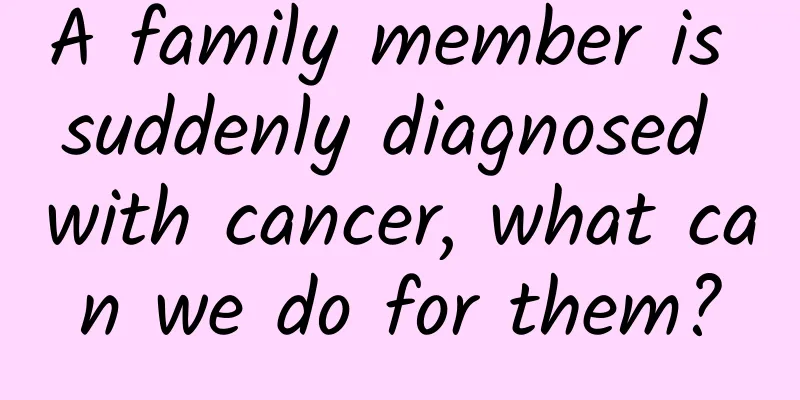A family member is suddenly diagnosed with cancer, what can we do for them?

|
It is inevitable that relatives, friends, and acquaintances around us will suffer from cancer, and we all have to deal with cancer patients. Especially as relatives who live with cancer patients every day, when facing cancer patients, we really want to know: Is there anything we should pay attention to? As World Cancer Day is approaching, let’s talk about this topic today~ A loved one has cancer How should family members cope? 1. It is most important to understand this matter clearly, don’t panic and lose your composure! When someone in the family is diagnosed with cancer, many people panic and don't know what to do next. As a family member, you must calm down at this time and don't rush to seek medical treatment. Copyright images in the gallery. Reprinting and using them may lead to copyright disputes. Panic often comes from the fear of the unknown and the uncertain future. The first step to overcome panic is to understand what you are panicking about and figure out the condition. Before making a decision (such as giving up treatment, deciding on surgery or chemotherapy or radiotherapy), be sure to communicate with your doctor to confirm these two basic information: First, has his cancer been diagnosed? Is it cancer? What pathological type of cancer is it? (Blood tests or imaging tests cannot be used as a basis for diagnosis; pathological examination is the gold standard) Second, has it been staged? What stage is it? (Different stages lead to different treatment strategies and prognoses) In addition, family members who are sober, rational, and have certain medical knowledge and medical skills are the most powerful support for their relatives with cancer, and can really save lives at critical moments. A good result depends on the doctor, but first of all, it depends on the patient himself and his family. 2. Should we conceal the patient’s condition? When a loved one is diagnosed with cancer, should you hide it or tell them? This is a question that many people struggle with. From the perspective of disease diagnosis and treatment, it is recommended to let patients know their condition as much as possible so that they can better cooperate with examinations and treatments. Cancer treatment is a long-term comprehensive treatment process. You can hide it for a while, but not for a long time. As long as the patient is willing to pay a little attention, he will know the disease sooner or later, and the shock he will receive at that time will be even greater. Cancer can be cured through active treatment, but the family members' concealment may make the patient mistakenly believe that he is terminally ill, deepen his fear, and even commit suicide. It is really a pity. Of course, whether or not to inform cancer patients of their condition depends on a case-by-case analysis. It should not be done just for the sake of informing. It should be determined based on the patient's gender, age, personality, religious beliefs, educational background and cultural level, psychological quality, etc. You may wish to communicate and discuss with the doctor in charge, and decide whether to disclose all or selectively disclose part of the information based on the specific situation. The most important thing is to follow the principle of "maximizing patient benefits", weigh the pros and cons, and decide what is most conducive to treatment and recovery. For example, in the early stages of cancer, the possibility of cure is high, and concealing the truth is actually not very meaningful. Patients should be made to understand that although they have cancer, it can be cured in the early stages. This can enhance the patient's confidence in fighting cancer and enable the patient to cooperate better with treatment. Living with Cancer Patients What should I pay attention to? People often ask, can we eat with someone who has cancer? Should we use separate bowls and chopsticks? What should we pay attention to when living with a cancer patient? The essence of this problem is the fear of cancer being transmitted. Some people therefore avoid and guard against their relatives and friends who have cancer. They dare not hug, eat together, or shake hands with them. What's worse, some people dare not stay together for a long time, for fear of being infected with cancer. Copyright images in the gallery. Reprinting and using them may lead to copyright disputes. In fact, so far, there is no sufficient evidence to prove that cancer can be transmitted from person to person, and there is no need to worry about cancer being transmitted through daily life contact. Should we use separate bowls and chopsticks if there is a cancer patient at home? Of course, we should try to use separate bowls and chopsticks, but this has nothing to do with cancer transmission. It is considered from a hygiene perspective. If there is no cancer patient at home, we should also do this. Remember: If a family member or friend unfortunately gets cancer, please take more time to accompany them, eat with them, shake hands with them, hug them... Don't discriminate, give them more care and nursing, don't be on guard and avoid them, don't rub salt into their wounds, and don't cause them double physical and mental harm. How can family members of cancer patients take good care of themselves? When talking about cancer, without exception, everyone focuses on cancer patients. This is of course reasonable, after all, cancer patients are the direct "parties involved" and are hit the hardest. If the disease progresses, it may eventually endanger their lives. However, because the family members of cancer patients are "healthy people", their "tiredness", "hardship" and "bitterness" are often ignored and do not receive the attention they deserve. So, what will happen to healthy relatives who stay with cancer patients for a long time? One is the mental pressure and mental fatigue. Sometimes it is inevitable to become impatient and anxious, and this invisible pressure often cannot be vented. The second is the physical stress and fatigue. Long-term caregiving, frequent trips to the hospital, taking care of the patient's daily routine, running around, plus mental stress, can easily cause physical fatigue, health problems, and illness. The third is the great economic pressure and the fatigue at the social level. For ordinary families, economic pressure is indeed a real problem. Economic pressure will increase mental pressure and thus affect physical health. Therefore, while caring for their loved ones with cancer, the families of cancer patients should also take care of their own emotions and health and show more care to themselves. ★Instructions for visiting patients★ It is inevitable that there will be "human relationships" between people. Chinese people have always been particular about visiting sick relatives, friends and acquaintances to express their feelings and condolences. This is of course necessary, but there are a few things to remind everyone (including visiting the hospital or visiting the patient's home). ① If you happen to have a cold, flu, or respiratory infection/contagious disease such as COVID-19, try not to visit cancer patients. After suffering from cancer, the patient's immunity decreases and they are easily attacked by bacteria and viruses. It is recommended to postpone the visiting time, or to "greet" through phone calls, text messages, WeChat, etc. ② The visiting time should not be too long. Don’t let a well-intentioned visit or greeting turn into a disturbance, which makes the patient feel helpless and tired. ③ Don’t bring anything related to “treatment”, such as health products or folk remedies or secret recipes. These things have no clear effect and may even have adverse effects. When visiting, just express your thoughts, such as buying a bouquet of flowers, and don’t do anything that interferes with treatment. ④ Do not bring rumors you hear to the patient or his family. Some people, out of kindness, will share unreliable things they have heard or seen, which may interfere with the regular treatment that the patient is currently undergoing. Remember not to "do bad things with good intentions." This article is a work of Science Popularization China-Starry Sky Project Produced by: Science Popularization Department of China Association for Science and Technology Producer|China Science and Technology Press Co., Ltd., Beijing Zhongke Xinghe Culture Media Co., Ltd. Author: Pan Zhanhe, Chief Physician, Master's Supervisor, Department of Oncology, Zhongshan Hospital, Xiamen University Reviewer: Tang Qin, Director and Researcher of the Science Popularization Department of the Chinese Medical Association |
Recommend
The EU is wielding a tariff stick against Chinese electric vehicles, seeking peace through war and asking Chinese capital to build factories
The EU's imposition of punitive tariffs on Ch...
Detail page copywriting template with conversion rate over 85%!
Copywriting has always been a very popular job : ...
Why has WeChat group become a sensitive area for fund managers?
The "CITIC Leakage" has been brewing fo...
Is your phone battery draining too fast? These bad charging habits are the culprits. Let's see if you are one of them.
Many mobile phone users have found that after usi...
Resource station profiteering, long-term and stable money-making project
We all know that traffic is the essence of all bu...
An ultra-distant black hole "eats" half of the sun every year and throws the "residues" to the earth!
The artist's concept above shows a supermassi...
The "big questions" of TikTok's live broadcast room "Mastering TikTok's core technology" to seize the dividends of the global live broadcast era
The "big questions" of TikTok's liv...
HP: New laptops will replace MacBook's innovative position
PC maker Hewlett-Packard will unveil its next-gen...
If we live long enough, will everyone eventually develop Alzheimer's?
November 26, 1901, Frankfurt, Germany. A young cl...
iOS 9.3 new feature: Wi-Fi Assistant clearly identifies traffic consumption
Since the new Wi-Fi Assistant feature was added to...
Example analysis: How does Love Bank APP achieve user fission?
The user fission of Love Bank is very ingenious. ...
Li Jianyu 7-day singing bowl body and mind healing course singing bowl music purifies energy micro-course video + audio course
Li Jianyu's 7-day singing bowl body and mind ...
Short video emotional gameplay project, violent monetization to achieve a monthly income of 10,000+
Course Catalog: 1. Emotional projects on TikTok 2...
What happens when your brain splits open?
Where does consciousness exist? This is a questio...
Teacher Qianhe has a complete guide for smart app developers waiting for you to open
This year, the mini program war between BAT and B...









